新世纪高职高专英语综合教程1-Unit-5
- 格式:ppt
- 大小:5.26 MB
- 文档页数:22
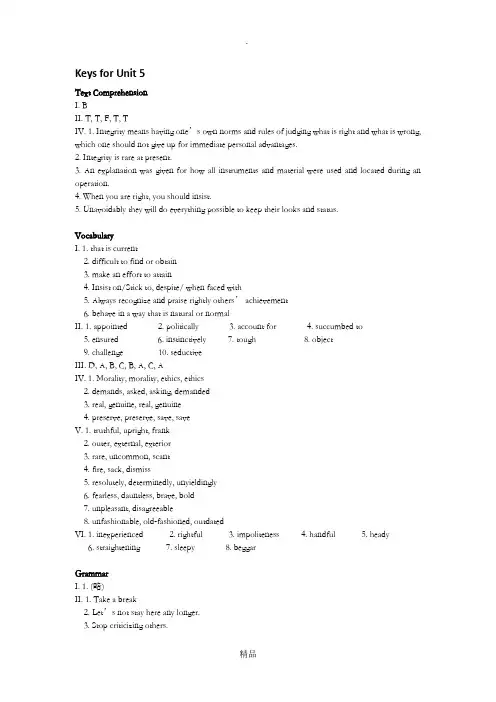
Keys for Unit 5Text ComprehensionI. BII. T, T, F, T, TIV. 1. Integrity means having one’s own norms and rules of judging what is right and what is wrong, which one should not give up for immediate personal advantages.2. Integrity is rare at present.3. An explanation was given for how all instruments and material were used and located during an operation.4. When you are right, you should insist.5. Unavoidably they will do everything possible to keep their looks and status.VocabularyI. 1. that is current2. difficult to find or obtain3. make an effort to attain4. Insist on/Stick to, despite/ when faced with5. Always recognize and praise rightly others’ achievement6. behave in a way that is natural or normalII. 1. appointed 2. politically 3. account for 4. succumbed to5. ensured6. instinctively7. tough8. object9. challenge 10. seductiveIII. D, A, B, C, B, A, C, AIV. 1. Morality, morality, ethics, ethics2. demands, asked, asking, demanded3. real, genuine, real, genuine4. preserve, preserve, save, saveV. 1. truthful, upright, frank2. outer, external, exterior3. rare, uncommon, scant4. fire, sack, dismiss5. resolutely, determinedly, unyieldingly6. fearless, dauntless, brave, bold7. unpleasant, disagreeable8. unfashionable, old-fashioned, outdatedVI. 1. inexperienced 2. rightful 3. impoliteness 4. handful 5. heady6. straightening7. sleepy8. beggarGrammarI. 1. (略)II. 1. Take a break2. Let’s not stay here any longer.3. Stop criticizing others.4. Have another biscuit, please.5. In this play you be the princess and I be the witch.6. Go and buy yourself a new pair of shoes.7. Don’t you ever be late again! / Never be late again!8. Let us never forget the brave men and women who made the ultimate sacrifice.III. 1. will/can/can’t you 2. will/won’t you 3. will you 4. shall we5. will/could/can you6. will/won’t/can’t you7. will you8. shall weIV. 1. 3, 5, 4, 8, 7, 2, 1, 6V. 1. another 2. another 3. others 4. other 5. another 6. the other7. the others 8. another, othersTranslationI. 1. 人的一生就像被刚降下的雪覆盖的田野,无论在哪儿走过都会留下自己的足迹。
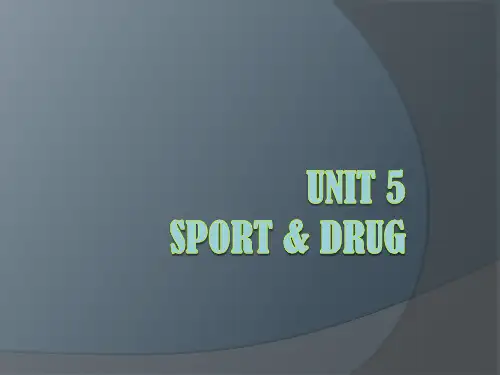
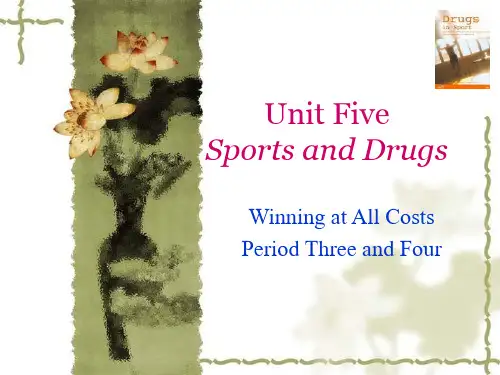
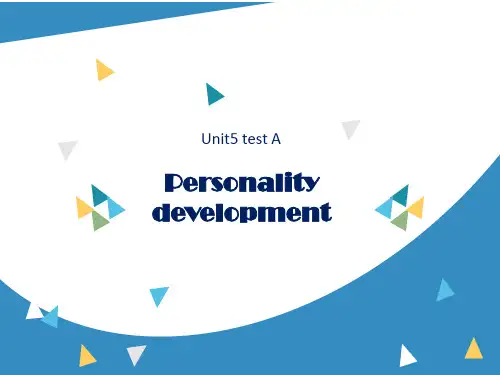
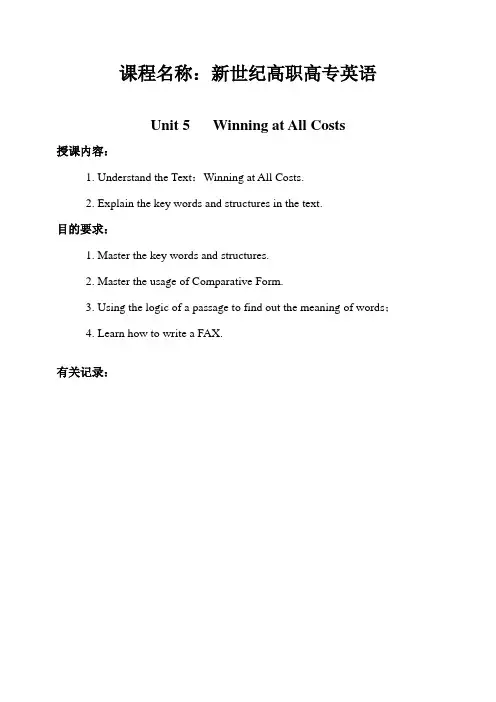
课程名称:新世纪高职高专英语Unit 5 Winning at All Costs授课内容:1. Understand the Text:Winning at All Costs.2. Explain the key words and structures in the text.目的要求:1. Master the key words and structures.2. Master the usage of Comparative Form.3. Using the logic of a passage to find out the meaning of words;4. Learn how to write a FAX.有关记录:板书设计:Unit 5 Winning at All CostsLead In: How to keep fit? And which way(s) do you likemost?a.diet – more vegetables, fruits and less fattiness,cholesterolb.physical exercise – running, playing balls, swimming, dancing etc.c.living conditions – pressure, tension, anxiety, less sleepingd.taking drugs – taking drugs to lose weighte.operation – extracting the fattinessfloor exercise high jumpuneven bars hop, step and jump gymnasium balance beam discus throwhorse-vaulting field shot putrings javelin throwparallel bars hammer throwpommel horse broad jumpUnit 5 Winning at All CostsPeriods 1-2Lead in(15 mins)1.Ask the students to look at the pictures on page 65 in the textbook and discuss in pairs different ways they would choose in order to keep them fit. Then ask some students to tell their choices2.Ask the students to point out the advantages and disadvantages of the different ways they keep fit.Read In(10 mins)Background Information1)The Olympic GamesThe origin of the Olympic Games is linked to many Greek myths. The institution of the Olympic Games began in 776 B.C. and lasted for 12 continuous centuries before it was abolished in 393 A.D. The first contemporary Olympic Games took place in 1896 in Athens. The modern Olympic Games are the world’s largest pageant of athletic skill and competitive spirit. But at the same time, they have also been displays of nationalism, commerce and politics, which inevitably result in drug misuse for better performance in competitions.2) Drug Misuse and Anti-Doping TestsTo promote their strength and endurance, athletes have long resorted to the use of prohibited substances such as stimulants. The last half of the 19th century saw the beginnings of modern medicine and a significant growth in the use of drugs to improve athletic performance. In 1967 the International Olympic Committee began to take actions againstdoping. The Olympics over the past three decades have witnessed a lasting war between development of performance-enhancing drugs and study of prohibited substances as well as effective anti-doping tests.3) Health Risks of DopingApart from undermining the fairness of competition, the use of drugs can actually rebound on the athlete and cause irreversible damage to the health of athletes. So the fight against the practice of doping in sports not only preserves the well being of Olympic sport and the integrity of competition, but also ensures the health of athletes.Prohibited drugs temporarily boost athletic performance, but in the long run, they can lead to liver damage, strokes, heart attacks and so on. Besides, the athletes who took illegal drugs reported birth defects in the children, and other ongoing troubles such as excessive body hair and deep voices.4) Topic-related Words and Phrasesstimulants:any substance that causes an increase in activity in various parts of the nervous system or directly increases muscle activity. Drugs such as caffeine and the amphetamines belong in this category. Athletes use stimulants to boost their muscle power, heighten their oxygen carrying capacity, and transform their endurance.amphetamines:any one of a group of drugs that are powerful central nervous system stimulants. They can temporarily reverse the effects of fatigue, enhance mental alertness and the ability to concentrate.calmers:or depressants, any one of various substances that depress the nervous system. Athletes take some of them to enable them to train and compete despite pain and injury. Others stop an athlete from trembling, reduce their blood pressure, slow their heart rate and have a calming effect.doping:the practice of using prohibited drugs to promote athletic performance.Detailed Study of the Text(60 mins)Read In Questions1.What’s“fair play”?Answer:“Fair play” means true sportsmanship.2.What does the title “Winning at All Costs” imply?Answer: The title means that some athletes use illegal drugs in order to win the championship.3.What is the result of taking drugs?Answer: It not only does a lot of harm to the health of athletes, but spoils the principle of “fair play ” in sports competition.4.What harm will the drugs do to athletes?Answer: Drugs can make a person ill-tempered and violent. And they may cause heart attacks . The users of certain drugs will feel tired and washed out in the end.Language Points(T explains first, then gives Ss Chinese and asks Ss to translate them into English)1. athlete n. [athletic, athletics]1) person who competes in sports 运动员2) person who has the strength and skill to perform well at sports 身强力壮的人She is a born athlete.2. keen a. (a fight or competition) very hard to win 激烈的There is expected to be keen competition in the election of the chairman of the student union. Susan won the men’s semi-final at the Australia Open after a keen fight against Roger.3. side effect: secondary, usually unpleasant or unplanned effect 副作用The pill has some side effects including weight gain and headaches.Side effects of modern life are quick-paced life and stress.4. illegal a. against the law 违法的;非法的It is illegal to park your car here, sir.It is illegal to sell cigarettes to adolescents.5. event n.1) sth. that happens, especially when it is unusual or important(大)事件The chief event of 1945 was the ending of World War II.2) any of the races, competitions, etc. in a sports program比赛项目Which events have you entered for?A lot of major sports events have been held in this stadium.6. have an effect on sb.: produce an impression, cause an action, etc. 产生后果,影响I’ve told her again and again, but it has no effect on her.The book had a significant effect on the whole generation.7. prove :v.show that sth. is true or certain by means of argument or evidence 证明,证实He failed to prove that he was innocent.He was accused of exaggeration; but now his theory of population proves to be correct.8.rely on/upon: count or depend on 依赖We increasingly rely on computers to work.I know I can always rely on you to work out a solution.9. strip (sb. of sth.) :v. take away (property, honours, etc.) from sb. 剥夺The officer was stripped of his rank and all his privileges after he had been proved corrupt. Stripped of all his possessions, he was rejected by all his friends.9. performance n.(especially outstanding) action or achievement 表现He was promoted to the position of manager for his excellent performance.Your performance in the exam is not very satisfactory.playing (a piece of music) or acting (a play) to entertain the audience 表演Will you come and watch our performance tonight?10. ancient a. belonging to times long past 古代的,古老的China is one of the cradles of ancient civilization.Villagers there still keep their ancient traditions.11. diet n.1) sort of food that is usually eaten (by a person, community, etc.) 日常食物,日常饮食Japanese diet of rice, vegetables and fish is good for your health.2) limited variety or amount of food that is eaten for a special purpose (适合某种疾病或有助于减肥等的)特种饮食Doctors suggest a low-salt diet for the old.Collocation: on a diet 节食12. when it comes to (doing) sth.:when it is a matter of (doing) sth. 当说到……的时候She finds it hard to resist the temptation when it comes to food.He is an expert when it comes to gardening.13.stimulant n.drug that increase physical or mental activity and alertness 兴奋剂Coffee and tea are mild stimulants.event, activity that encourages greater or further activity 起刺激作用的事情Discount is no longer a stimulant to consumption.14. stress n.(pressure or worry resulting from) mental or physical distress, difficult circumstances, etc. 压力,忧虑He moved to the country to escape from the stresses of modern city life.All the employees here suffer from stress.15. be washed out: very tired and lacking in energy 疲惫的She looked washed out after her illness.She was washed out after a long day’s work.Assignment 1 (5 mins):Finish off Ex.Ⅰon Page 71.Unit 5 Winning at All Costs授课内容:1. Translations2. Grammar Tips3. Reading Skills4. Read More5. FAX目的要求:1. Master the key words and structures.2. Master the usage of Comparative Form.3. Using the logic of a passage to find out the meaning of words;4. Learn how to write a FAX.有关记录:板书设计:Unit 5 Winning at All CostsGrammar Tips – Comparative FormPeriods 3 – 4Translation of some sentences: (3 mins)Lines 19-20: With the development of medical science, modern athletes have an even wider choice when it comes to pills and drugs.随着医学的发展,现代运动员们在服用药物方面有着更广泛的选择。
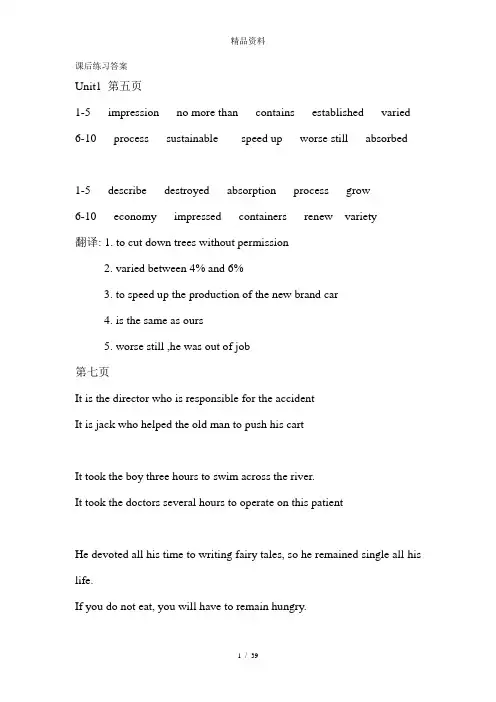
课后练习答案Unit1 第五页1-5 impression no more than contains established varied 6-10 process sustainable speed up worse still absorbed1-5 describe destroyed absorption process grow6-10 economy impressed containers renew variety翻译: 1. to cut down trees without permission2. varied between 4% and 6%3. to speed up the production of the new brand car4. is the same as ours5. worse still ,he was out of job第七页It is the director who is responsible for the accidentIt is jack who helped the old man to push his cartIt took the boy three hours to swim across the river.It took the doctors several hours to operate on this patientHe devoted all his time to writing fairy tales, so he remained single all his life.If you do not eat, you will have to remain hungry.As we mentioned just now, the problem is much more serious than you thoughtAs everybody knows, learning a foreign language takes much time第十页Accept receive received acceptLie laid lay lieAlone lonely lonely alone第十二页1.正确2.T hat—which3.W hich---that4.W ho---whom5.H e后加who6.W hich—whom7.W hich—where8.W hich—whose9.W hich—that10.H ouse后加In(1)w here(2)t hough(3)i t(4)a s(5)b ecause(6)i n(7)w ith(8)w ith(9)i f(10)gaveUnit 2 Capital citiesExercise I1. Washington,London,Ottawa, Canberra, Wellington2. earthquakes, diseases3. qualities4. advantages5. foreignExercise II1.is spoken of as2.leveled3.guard4.decaying5.associating6.peculiar7.are laid out8.ranks9.imitated10.imagineExercise III1. commerce2. present3. imitation4. association5. ambition6. glorious7. professional8. emperors9. imagination10. wonderfulExercise IV1.I found that the books were laid out neatly on the desk.2.We would like to thank all who had a share in this project.3.Their delay was due to bad weather.4.What influences people is not the past but the present andthe future.5.Generally speaking, people often associate politics withwars.6.Tom had a first-rate education, so he had an advantageover those children who were not as well educated as he.7.Many students complain that the food is by no meanssatisfactory.8.Their screams of excitement all but drowned out themusic.Exercise VModel 11.Most tourists speak of Guilin as an earthly paradise, abeautiful city on the Li River.2.People all over the world speak of Brazil as a dominantpower in soccer.Model 21.The air in a hilly region is cooler than that on plains.2.In my opinion, his misdoings are those of a fool.Model 31.A father should do whatever he can to make himselfworthy of the name of father.2.By doing so, he proved himself worthy of trust.Model 41.It would be worthwhile making such an experiment at thecost of so much money.2.It is worthwhile for the soldiers to fight or even die for thefreedom of their country.Use the right word1. able (be able to), capable (be capable of)A.ableB. capable of seatingC. able to comeD. capable of handling2. especially, speciallyA.especiallyB. speciallyC. speciallyD. especially3. compare, contrastpareB. comparedC. contrastsD. contrastsGrammar TipsI.1.which/that2.whom3.which4.where5.whom6.whose7.where8.that9.why10.whenII.1.choice2.mean3.that4.from5.been6.why7.their8.once9.so10.to11.All12.under13.over14.get15.right Practical reading⏹I: B E A C D⏹II: F F T F TPractical writing◆held at 4:30 p.m. on Wednesday, 10 October 2009 in theBeijing Conference Hall, Yangtze Tower, Pudong, Shanghai.(于2009年10月10日星期三下午4:30在上海浦东长江大厦北京厅举行。



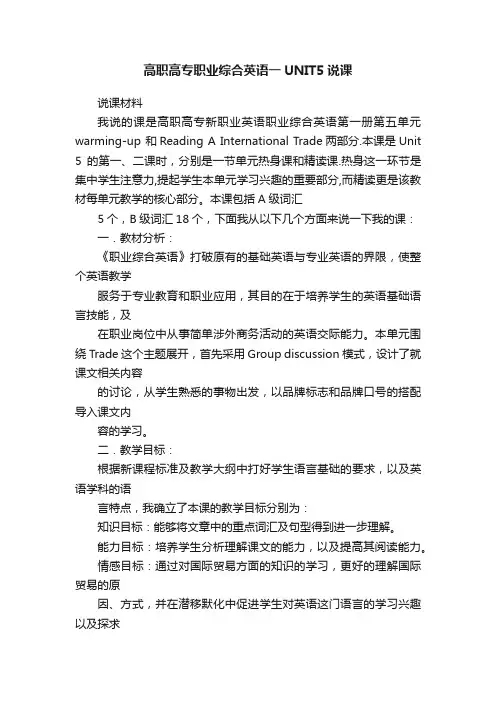
高职高专职业综合英语一UNIT5说课说课材料我说的课是高职高专新职业英语职业综合英语第一册第五单元warming-up 和Reading A International Trade两部分.本课是Unit 5的第一、二课时,分别是一节单元热身课和精读课.热身这一环节是集中学生注意力,提起学生本单元学习兴趣的重要部分,而精读更是该教材每单元教学的核心部分。
本课包括A级词汇5个,B级词汇18个,下面我从以下几个方面来说一下我的课:一.教材分析:《职业综合英语》打破原有的基础英语与专业英语的界限,使整个英语教学服务于专业教育和职业应用,其目的在于培养学生的英语基础语言技能,及在职业岗位中从事简单涉外商务活动的英语交际能力。
本单元围绕Trade 这个主题展开,首先采用Group discussion模式,设计了就课文相关内容的讨论,从学生熟悉的事物出发,以品牌标志和品牌口号的搭配导入课文内容的学习。
二.教学目标:根据新课程标准及教学大纲中打好学生语言基础的要求,以及英语学科的语言特点,我确立了本课的教学目标分别为:知识目标:能够将文章中的重点词汇及句型得到进一步理解。
能力目标:培养学生分析理解课文的能力,以及提高其阅读能力。
情感目标:通过对国际贸易方面的知识的学习,更好的理解国际贸易的原因、方式,并在潜移默化中促进学生对英语这门语言的学习兴趣以及探求知识的欲望。
三.教学重点:根据以上的教学目标我本次课对重点词汇的理解和运用,对重点句子的分析和理解,以及名词性从句的知识要点为本课教学的重点。
重点词汇:opportunity,export,profit,exchange,participate,benefit,better off,regardless of, specialize in ,make sense, ,be inclined to 重点句子:The reason people trade,regardless of where they live,is that they believe they will be better off by trading.It takes the lawyer less time to type letters than it does the assistant.四.教学难点:学生对课文的分析理解课文的能力为重点。
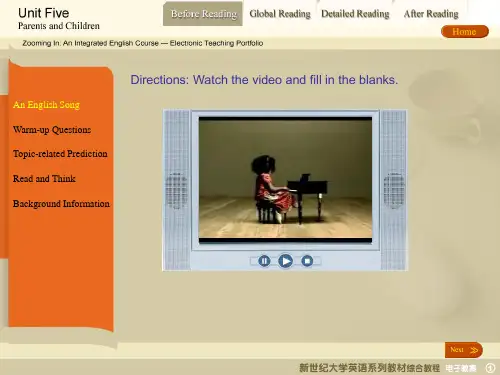
《新世纪大学英语》(第二版)第一册Unit 5Translation1、威廉非常喜欢那个女孩子,所以他尽力讨好她,并且很有信心可以赢得她的心。
William likes the girl a lot so he tries very hard to impress her and is optimistic that he will win her heart.2、他有创造性,对未来也有很好的判断力,可就是喜欢秘而不宣。
He is very creative and has a good vision of the future ,but he likes to keep things to himself.3、他们来自一个贫穷的小山村,那里人们远离现代文明。
They came from a poor village where people were shut off from modern civilization.4、我们要努力工作,争取达到我们所定下的目标。
We must work hard and make an effort to achieve the goals that we have set.5、我们应该满足于我们所拥有的一切,不该对周围的事情太吹毛求疵。
We should learn to be content with all that we have and should not be too critical about things around us.6、他们经常代表学校参加辩论比赛;今晚我们将聚会庆祝他们的成功。
They often represent our school in debating competitions; tonight we will throw a party to celebrate their success.7、通过读书他不仅开阔了视野,而且学会了不断地完善自己的人格。
世纪英语综合教程I(第五版)教案授课主要内容Unit 1 College Life (1st and 2nd hours)Warm-upTask 1 I am a freshman.Objective: Ss can make a brief self-introduction to the class.Steps:• Ss read Warm-up Task 1.• Ts explain the new words in Task 1.• Ask Ss to introduce themselves according to their own information.Task 2 My study plan in the fresh semester.Objective: Ss can make an English study plan by themselves.Steps:• Ask Ss to make their choices.• Ss give their answers.• Ask Ss to tell the class about their new English study plans.Listening &SpeakingTask 1 Are you Jack Smith from America?Objective: Ss can understand the conversation briefly and fill in the blanks with correct words or phrases. Steps:• Play the tapescript two times.• Ask Ss to listen carefully and fill in the blanks.• Ask Ss to tell the class their answers.Answers: (1) Excuse me (2) I’m (3) Nice to meet you (4) Me, too (5) Thank you very much. Task 2 How are you these days?Objective: Ss can understand the conversation briefly and tick up the correct information.Steps:• Play the tapescript two times.• Ask Ss to tick the correct information and give the answers.Answers: Tick: (1), (2), (4).Task 3 Would you like to have a look at my dorm?Objective: Ss can understand the conversation and complete the answers with correct information. Steps:• Play the tapescript two times.• Ask Ss to listen and understand briefly the conversation and complete the answers.• Ask Ss to give the answers.Answers: 1) have a look at 2) Three 3) small but bright 4) 5th5) No, there isn’tTask 4 Sports club will take in new members.Objective: Ss can understand the conversation and put the five given sentences into correct order. Steps:• Play the tapescript two times.• Ss listen to the conversation and give the correct order.• Ask Ss to give the answers.Answers: ( 3 )----( 1 )----( 5 )----( 2 )----( 4 )Task 5 Don’t use the word “fail”.Objective: Ss can understand the passage and fill in the blanks with correct words or phrases. Steps:• Play the tapescript three times.• Ss listen and give the correct words or phrases.• Ss give the answers, if their answers are not correct, Ts correct them.Answers: (1) examinations (2) allowed (3) suggest (4) unhappy (5) lose heart (6) believe(7) success (8) takeTask 6 My study at college.Objective: Ss can make a conversation about college study.Steps:• Ask Ss to spend several minutes preparing for the conversation.• Ss present their conversations to the class.• Ts give necessary guidelines and help to Ss. Ts first invite those who are better in English learning to present their conversations. If time doesn’t permit, assign the task as after-class assignments. Conversations:Wendy: Hi, Bob! Nice to see you again on the campus. How is everything going on with you?Bob: Fine, thank you. I like this college. I like my new teachers and classmates.Wendy: How about your courses? Do you like them?Bob: Yes, I like them very much.Wendy: What do you major in now?Bob: I major in computer science. At the moment I am learning how to program.Wendy: That sounds really interesting.Bob: Yes, but I feel that it is a little difficult.Wendy: Are you doing well in your classes?Bob: I don’t know because I haven’t received any test results yet. However, I have confidence in myself.Assignments1. Review what has been learned in Listening&Speaking;2. Preview Reading A in this unit.世纪英语综合教程I(第五版)教案授课主要内容Unit 1 College Life (3rd and 4th hours)Reading APreliminary StageSteps:• Ask Ss to answer: what is college life? How can freshmen get along well with their college mates, classmates and roommates?• Ts introduce the background information about college life to students.Reading text learning1. New words and expressionsObjective: Ss can read the new words and expressions correctly; remember these new words and expressions.Steps:• Ss listen to the new words and expressions.• Ask Ss to read the new words and expressions.2. Reading Text AObjective: Ss can understand the reading text, put it into good Chinese and grasp the important words, phrases and sentence patterns in the reading text.Steps:• Ts explain the reading text:Language points:Paragraph 2sense n. a person’s special power of the body to be conscious of somethinge.g. a sense of humor/responsibility/belongings/achievementsHe has a good sense of smell.in a sensee.g. This plan is practical in a sense.make sensee.g. It makes no sense to talk about it in general.c.f. sensible a. reasonable; practicale.g. It is sensible of you to do it.We think the plan sensible.be sensible of:be aware ofe.g. He is sensible of the danger before him.c.f. sensitive a. easily receiving impressions;able to record small changese.g. My skin is sensitive to sunlight.The instrument is sensitive to the earthquake.find out:learn sth. by study, calculation or inquirye.g. Have you found out the source of the rumor?Please find out when we’ll start off tomorrow.share vt. have or use sth. with sb.; have sth. in common1) share sth. with sb.:e.g. When at home, I have to share a bedroom with my younger brother.2) share (in) something:e.g. We two will share (in) the rent.The husband shares (in) his wife’s happiness and sadness.Paragraph 3arise vi. come into existence; present itselfe.g. An unexpected problem arose in our discussion.Different opinions have arisen among the students.be responsible for: having the obligation to make decisions or bear the blame for mistakes e.g. Teachers should be responsible for the safety of pupils when having a spring outing.We think the driver is responsible for the traffic accident.topic n. subject for discussione.g. None of the topics interested me.Good morning, class. Today my topic is on the present situation at home and abroad. Paragraph 4set aside: put aside, lay asidee.g. Every day I set aside half an hour for sports.You’d better set aside some money for a rainy day.Paragraph 5agree: say “yes”, consent1)agree with sb.e.g. You say reading is important in learning English. I can’t agree with you more.2) agree to sth.e.g. All the class agreed to the study plan.3) agree on/upon sth.e.g. Both parties finally agreed on the contract.Paragraph 6avoid vt. keep or get away from; escapeavoid doing sth.e.g. You must learn the lessons from the accident to avoid making the same mistake.avoid being donee.g. I’ll go that way to avoid being seen by the boss.Paragraph 7belongings (pl.) n. one’s possessionse.g. Take all your belongings with you when you get off the train.Personal belongings should be taken good care of.Chinese translation of the reading text:和室友和睦相处1. 当你离开父母和家乡进入大学,将要在新的校园里开始新的生活,你准备好了吗?上大学的首要挑战不在教室,而是在你第一次遇见宿舍室友的时候。
《新世纪高职高专英语》(第一册)教案Unit5 winning at All CostsNew words and Expressions:.ancient1. 古代的We were impressed by the ruins of an ancient building.我们对一处古建筑废墟印象颇深。
2. 古老的;古旧的,旧的He drives an ancient car.他开着一辆老式汽车。
3. 年老的,高龄的4. 自古以来的This is an ancient custom.这是一个自古相传下来的习俗Archern. 射手, 弓术家, 【天】人马星座athleten. 运动员, 运动选手1.An athlete in excellent shape. 竞技状态极佳的运动员2.an athlete noted for accurate aim. 因准确射击而著名的运动员。
3.an athlete who plays for pay. 为钱而比赛的运动员。
Athleticsn. 体育(运动); 竞技; [英]田径运动1. He is good in athletics. 他擅长运动。
2. What sports are called heavy athletics? 称作重竞技项目的都有哪些项目?banv. 禁止smoking is banned in school.n. 禁令1. Partial Nuclear Test Ban Treaty . 部分禁止核试验条约2. There is a ban on smoking. 有一个禁烟令。
3. The medical ban is lifted. 从医学角度讲,禁令是解除了;Competev.竞争(with,in)比赛(in)对抗(against,with)1. compete with other countries for world market与其它国家竞争国际市场2. compete in a race参加赛跑3. compete with [against] sb. for sth.与某人竞争而获得某物4. The young tennis player has often compete d against famous players, but so far he has always been beaten.那位年轻的网球运动员常与著名球员对抗比赛,可是到目前为止,他总是输的。
高职国际进阶英语综合教程1unit5课文原文和译文Home entertainment in the USAWhat is the difference between “entertainment” and “hobbies”? Well, you don’t really do anything with entertainment (you get entertained), while hobbies are more active (you do hobbies).Watching TV is still the most popular form of home entertainment in the USA. According to US government statistics, watching TV is the leisure activity that occupies the most time (2.8 hours per day). This is about half of all leisure time that those aged 15 and over have.Visiting friends or chatting online is the next most common leisure activity. This takes up nearly 45 minutes every day.Men are more interested in spectator sports than women –21 per cent compared with a figure of 16 per cent for women.It is not surprising that on an average day, adults aged 75 and over spend 7.8 hours on leisure activities. This is more than any other age group. Because they have to go to work and run a household, 35-to 44-year-olds spend only 4.3 hours on leisure activities. This is less than any other age group.The time that different age groups spend reading, playing video games or using a computer for leisure is different, too. People aged 75 and over read about one hour per weekend day; they play video games or use a computer for leisure for about 26 minutes. People aged 15 to 19read for an average of only 5 minutes per weekend day, but they spend one hour playing video games or using a computer for leisure.However, this is beginning to change. Just a few years ago,playing computer games and visiting social networking sites like Facebook or MySpace was something almost only young people did. Now, more and more older people are doing it. They find that it can be a wonderful way of relaxing after a hard day’s work.Text A课文译文美国的家庭娱乐“娱乐”与“爱好”区别在哪里呢?娱乐你无需做任何事情(你得到娱乐),而爱好则更加主动一些(你从事业余爱好)。